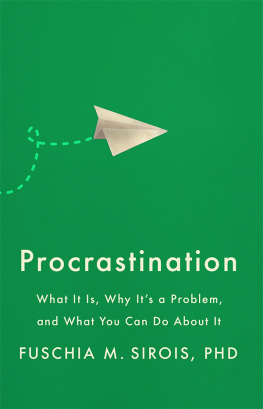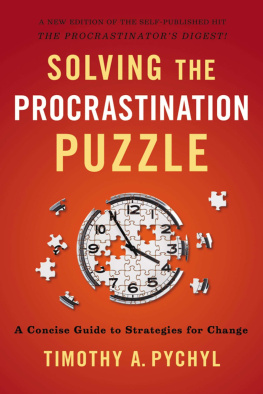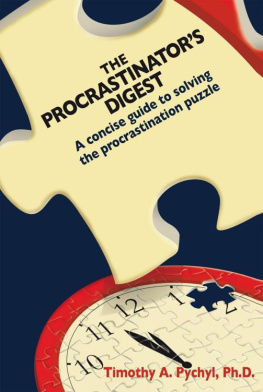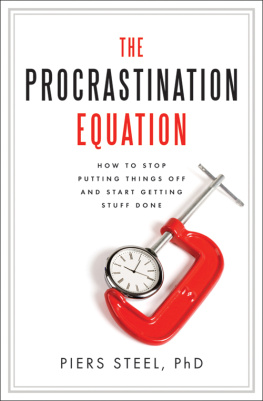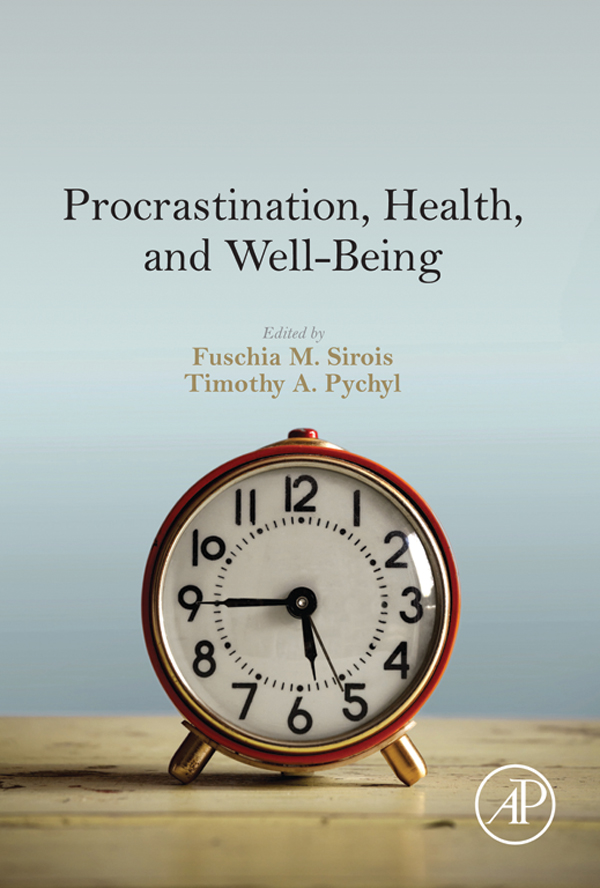Procrastination, Health, and Well-Being
Edited by
Fuschia M. Sirois
Department of Psychology, University of Sheffield, Sheffield, United Kingdom
Timothy A. Pychyl
Department of Psychology, Carleton University, Ottawa, Ontario, Canada
Table of Contents
Copyright
Academic Press is an imprint of Elsevier
125 London Wall, London EC2Y 5AS, United Kingdom
525 B Street, Suite 1800, San Diego, CA 92101-4495, United States
50 Hampshire Street, 5th Floor, Cambridge, MA 02139, United States
The Boulevard, Langford Lane, Kidlington, Oxford OX5 1GB, United Kingdom
Copyright 2016 Elsevier Inc. All rights reserved.
No part of this publication may be reproduced or transmitted in any form or by any means, electronic or mechanical, including photocopying, recording, or any information storage and retrieval system, without permission in writing from the publisher. Details on how to seek permission, further information about the Publishers permissions policies and our arrangements with organizations such as the Copyright Clearance Center and the Copyright Licensing Agency, can be found at our website: www.elsevier.com/permissions.
This book and the individual contributions contained in it are protected under copyright by the Publisher (other than as may be noted herein).
Notices
Knowledge and best practice in this field are constantly changing. As new research and experience broaden our understanding, changes in research methods, professional practices, or medical treatment may become necessary.
Practitioners and researchers must always rely on their own experience and knowledge in evaluating and using any information, methods, compounds, or experiments described herein. In using such information or methods they should be mindful of their own safety and the safety of others, including parties for whom they have a professional responsibility.
To the fullest extent of the law, neither the Publisher nor the authors, contributors, or editors, assume any liability for any injury and/or damage to persons or property as a matter of products liability, negligence or otherwise, or from any use or operation of any methods, products, instructions, or ideas contained in the material herein.
Library of Congress Cataloging-in-Publication Data
A catalog record for this book is available from the Library of Congress
British Library Cataloguing-in-Publication Data
A catalogue record for this book is available from the British Library
ISBN: 978-0-12-802862-9
For information on all Academic Press publications visit our website at https://www.elsevier.com/

Publisher: Nikki Levy
Acquisition Editor: Emily Ekle
Editorial Project Manager: Barbara Makinster
Production Project Manager: Julie-Ann Stansfield
Designer: Matthew Limbert
Typeset by Thomson Digital
List of Contributors
Joel H. Anderson , Ethics Institute, Department of Philosophy and Religious Studies, Utrecht University, Utrecht, The Netherlands
Maria I. Argiropoulou , Department of Psychology, National and Kapodistrian University of Athens, Athens, Greece
Eve-Marie C. Blouin-Hudon , Department of Psychology, Carleton University, Ottawa, Ontario, Canada
James Crooks , Department of Philosophy, Bishops University, Sherbrooke, Quebec, Canada
Wendelien van Eerde , Human Resource ManagementOrganizational Behavior, Amsterdam Business School, University of Amsterdam, Amsterdam, The Netherlands
Benjamin Gigure , Department of Psychology, University of Guelph, Guelph, Ontario, Canada
Mohsen Haghbin , Department of Psychology, Carleton University, Ottawa, Ontario, Canada
Anastasia Kalantzi-Azizi , Department of Psychology, National and Kapodistrian University of Athens, Athens, Greece
Bart A. Kamphorst , Ethics Institute, Department of Philosophy and Religious Studies, Utrecht University, Utrecht, The Netherlands
Floor M. Kroese , Department of Clinical and Health Psychology, Utrecht University, Utrecht, The Netherlands
Sanne Nauts , Department of Clinical and Health Psychology, Utrecht University, Utrecht, The Netherlands
Timothy A. Pychyl , Department of Psychology, Carleton University, Ottawa, Ontario, Canada
Denise T.D. de Ridder , Department of Clinical and Health Psychology, Utrecht University, Utrecht, The Netherlands
Fuschia M. Sirois , Department of Psychology, University of Sheffield, Sheffield, United Kingdom
Anastasia Sofianopoulou , Department of Psychology, National and Kapodistrian University of Athens, Athens, Greece
Mamta Vaswani , Department of Psychology, University of Guelph, Guelph, Ontario, Canada
Preface
For some people, this book may come as a bit of a surprise. Whereas we might all understand a title such as Procrastination and Productivity, how do we make sense of a book that brings together procrastination and health? The common assumption is that procrastination, that thief of time, is a problem of poor planning, last-minute efforts, and compromised performance. We take it for granted that the needless delay of procrastination undermines our success, but is it also related to our health and well-being? The answer provided by the various contributions to this book is clearly yes. Over the past two decades, researchers have been demonstrating that procrastination is a very important issue in terms of understanding who is healthy and happy, and who is not.
In 1997, Dianne Tice and Roy Baumeister published the first empirical report that demonstrated a relation between procrastination and health in an undergraduate student sample. Many of the results were as expected. For example, in both of their studies, self-reported procrastination was correlated positively with students turning in assignments later and correlated negatively with assignment grades. In other words, procrastinators completed their work later and received significantly lower grades, revealing a cost to procrastination. Interestingly, the longitudinal design of their second study revealed that in the short term, students who reported higher levels of procrastination faired better than their peers who reported lower levels of procrastination. In the early part of the semester, procrastination scores were negatively correlated with stress and physical symptom reports. However, this trend reversed over time. Later in the semester, procrastination was positively correlated with stress and physical symptom reports. In addition, students who reported more procrastination also reported significantly more visits to health-care professionals. Finally, by summing their data across the semester, Tice and Baumeister demonstrated that the overall cumulative effect of procrastination on stress and health was negative. Although early in the semester students who procrastinated seemed to benefit, this was only true when the deadline was remote; the overall net effect of procrastination was poorer academic performance, higher stress, and more illness.
I remember not only reading this article at the time of its publication, but also the flurry of media calls asking me about this study and what I thought it meant. Of course, I was pleased to be able to comment on this research, because it provided empirical support for something that both counselors and researchers understood all too well. Procrastination has its costs, and these costs include increased stress, poorer well-being, and negative effects on health. This seemed obvious to anyone who worked with people who procrastinated, but there had been no empirical studies to provide evidence of these clinical reports or anecdotes relating procrastination to illness. Moreover, their work helped categorize the short-term gain, long-term costs of procrastination as another form of self-defeating behavior that is a hallmark of poor self-regulation; a pattern that Baumeister and his colleagues have studied in terms of alcohol and drug abuse, overeating, compulsive shopping, violence, and other impulsive acts ().



